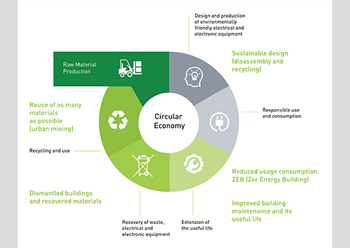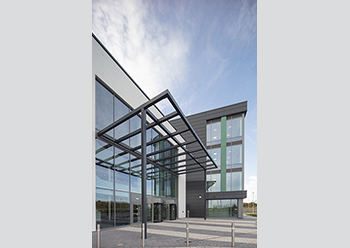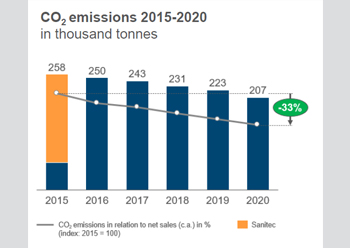
 Sharjah Sustainable City ... from concept to construction.
Sharjah Sustainable City ... from concept to construction.
Work is fast nearing completion on the first phase of Sharjah Sustainable City (SSC), which comprises 25 per cent of the total residential units in the development – or 280 villas – which are slated to be handed over this September.
According to the developers, mock-up villas on site at Sharjah’s first sustainable integrated city are now available for viewing.
“A brand new sales centre opened its doors last month (April),” says Yousif Ahmed Al-Mutawa, Chief Executive Officer of Sharjah Sustainable City. “It is equipped with the latest in digital technology to enhance customer experience and showcase model houses, masterplans, mood boards, and brochures effectively in a realistic 3D format.”
 |
|
Sharjah Sustainable City ... construction. |
A joint venture between Sharjah Investment and Development Authority (Shurooq) and Diamond Developers, which specialises in developing sustainable projects in the UAE, SSC aims to lead the global movement towards sustainable living and be a working model of future cities. The development incorporates practical solutions related to food security, water and energy management, as well as natural resources conservation.
Taking shape in Sharjah’s Al Rahmaniya area, the AED2-billion ($544 million) SSC covers a total area of 7.2 million sq ft and will include a total of 1,120 three-, four- and five-bedroom villas ranging from 2,035 sq ft to 3,818 sq ft in area, all with private parking. The energy-efficient homes come equipped with smart features and kitchen appliances.
Among the facilities hosted by the urban mixed-use project are a green mosque; a sustainable school focused on delivering a green-minded curriculum for pre-K to Grade 12; a mixed-use area featuring sports and wellness facilities including separate gyms for men and women; health clinics; a community mall with retail shops, food and beverage (F&B) outlets; as well as a green belt and nursery.
Social infrastructure includes indoor and outdoor gathering spaces comprising gyms, cycling and jogging tracks, parks and playgrounds for kids, a kindergarten and swimming pools.
 |
|
Some 280 villas of Sharjah Sustainable City (SSC) are slated to be handed over this September |
A future-ready city, Sharjah Sustainable City enfolds 280 villas. The villas blend with the environment ensuring a bond with the wider surrounding community. They are also built with nature in mind using the most efficient materials and facades and powered by solar panels placed on every rooftop.
The city is designed in accordance with the three pillars of sustainability: social, environmental, and economic. It embraces the concept of “living locally” in a fully-integrated, net zero energy (NZE), and vibrant community offering a unique and sustainable lifestyle.
As the first fully sustainable community in Sharjah, the city is powered by renewable energy produced from rooftop solar panels. It recycles its water and waste and produces vegetables and greens to enhance food security, Al-Mutawa says.
Highlighting some of the sustainable features built into the villas, he says: “The villa orientation avoids direct sun and maximises shading. Most south-facing facades are closed to reduce heat gains. The highly-insulated ultraviolet (UV) reflective walls, roofs and windows of the villas reduce air-conditioning loads, electricity consumption, and related emissions.
“The building envelope uses precast wall panels, which reduces construction waste compared to cast-in-situ while featuring a lower total embodied carbon. The windows are thermally insulated to reduce heat gains and air-conditioning loss. Also, light-coloured pavers are installed in all outdoor areas to reduce thermal discomfort during summer months and improve the microclimate. These pavers also prevent flooding!”
 |
|
SSC has an extensive network of walking and cycling paths to promote an active lifestyle. |
In addition, the villas are equipped with energy-efficient appliances to reduce electricity consumption including a VRF air-conditiong system, LED lighting, as well as smart home appliances (fridge, microwave, dishwasher and washing machine). The home automation (and presence sensors) systems automatically switch off energy-sapping systems if no users are present (can be deactivated). The air-conditioning controls allow residents to control their systems remotely and schedule operating hours when travelling back home.
The rooftop solar photovoltaic (PV) panels on all villas achieve up to 50 per cent offset, while the rooftop solar panels on all the parking areas offset 100 per cent of electricity consumption in the communal areas, Al-Mutawa remarks.
Low-flow water fixtures reduce wasteful water consumption while air-to-water makers (Atmospheric Water Generation, AWG) can be installed to produce drinking water (optional feature), he adds.
Also, monitoring devices allow residents to track their water and energy consumption in real time.
SSC has an extensive network of walking and cycling paths to promote an active lifestyle and clean mobility, thereby reducing emissions. These include 11.8 km of rubberised jogging tracks, 1.6 km of cycling tracks, and 8.4 km of pedestrian pathways.
Smart charging stations will encourage electric vehicle (EV) uptake (residential EV chargers are optional and available on demand). In addition, a driverless shuttle facilitates commute within SSC.
 |
|
Some 280 villas of Sharjah Sustainable City (SSC) are slated to be handed over this September |
SSC features a biogas plant to treat organic waste (food waste, green waste, and sludge), thus converting waste into a resource (electricity and/or thermal energy). Residues from the biogas plant will be dried and used as fertiliser for landscaping.
Sorting bins in the villas and sorting stations along the pathways encourage waste separation and will help avoid landfilling and associated pollution.
In addition, a sewage treatment plant (STP) at SCC will treat wastewater to produce treated sewage effluent (TSE) for landscape irrigation, achieving 100 per cent water recycling, and avoiding emissions associated with tankers, according to Al-Mutawa.
Urban farming, community gardening, and high-tech solutions such as vertical farming will be deployed to increase food production and support the UAE food security strategy. Indoor farming techniques including hydroponic NFT tables, multilayer planting, and aeroponics towers will also be used while farms will make up the productive landscape running the entire width of the city allowing community to produce their own food, Al-Mutawa concludes.

















.jpg)













 (1).jpg)
















































